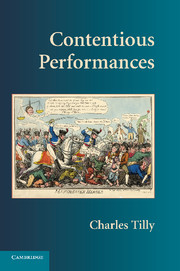Book contents
- Frontmatter
- Contents
- Boxes, Figures, and Tables
- Preface
- Contentious Performances
- 1 CLAIMS AS PERFORMANCES
- 2 HOW TO DETECT AND DESCRIBE PERFORMANCES AND REPERTOIRES
- 3 HOW PERFORMANCES FORM, CHANGE, AND DISAPPEAR
- 4 FROM CAMPAIGN TO CAMPAIGN
- 5 INVENTION OF THE SOCIAL MOVEMENT
- 6 REPERTOIRES AND REGIMES
- 7 CONTENTION IN SPACE AND TIME
- 8 CONCLUSIONS
- References
- Index
3 - HOW PERFORMANCES FORM, CHANGE, AND DISAPPEAR
Published online by Cambridge University Press: 05 June 2012
- Frontmatter
- Contents
- Boxes, Figures, and Tables
- Preface
- Contentious Performances
- 1 CLAIMS AS PERFORMANCES
- 2 HOW TO DETECT AND DESCRIBE PERFORMANCES AND REPERTOIRES
- 3 HOW PERFORMANCES FORM, CHANGE, AND DISAPPEAR
- 4 FROM CAMPAIGN TO CAMPAIGN
- 5 INVENTION OF THE SOCIAL MOVEMENT
- 6 REPERTOIRES AND REGIMES
- 7 CONTENTION IN SPACE AND TIME
- 8 CONCLUSIONS
- References
- Index
Summary
On 24 May 1768, local people staged a vivid contentious performance in Hastings, Sussex. As we transcribed reports of the performance for GBS:
The mob have already risen by the beat of a drum and insisted upon having wheat at 5s. per bushel. They then went to the house of Mr. White, a farmer, dragged him out to the middle of one of his own fields, [and] forced him to stay there while they broke open his granary and destroyed all his wheat. After this they returned and paraded it about the town. The mayor being afraid to oppose them, John Nicoll Esq., a Justice of the Peace, caused the ringleader to be brought before him and charged an officer with him, with a mittimus to convey him to Horsham Gaol. But the mob soon rescued their captain and then proceeded to Mr. Nicoll's house, whom they probably would have killed, if he had not made his escape through the back door.
As often happened in such reports, the phrase “destroyed all his wheat” actually meant that the attackers loaded it into carts and carried it away; they destroyed its value to Mr. White, but increased its value to local consumers. Our story came from very similar reports in Gentleman's Magazine, the Annual Register, and the London Chronicle. As was happening widely in England during that year of dearth, local people responded to shortage and high prices by taking collective control over the local food supply.
- Type
- Chapter
- Information
- Contentious Performances , pp. 62 - 87Publisher: Cambridge University PressPrint publication year: 2008



